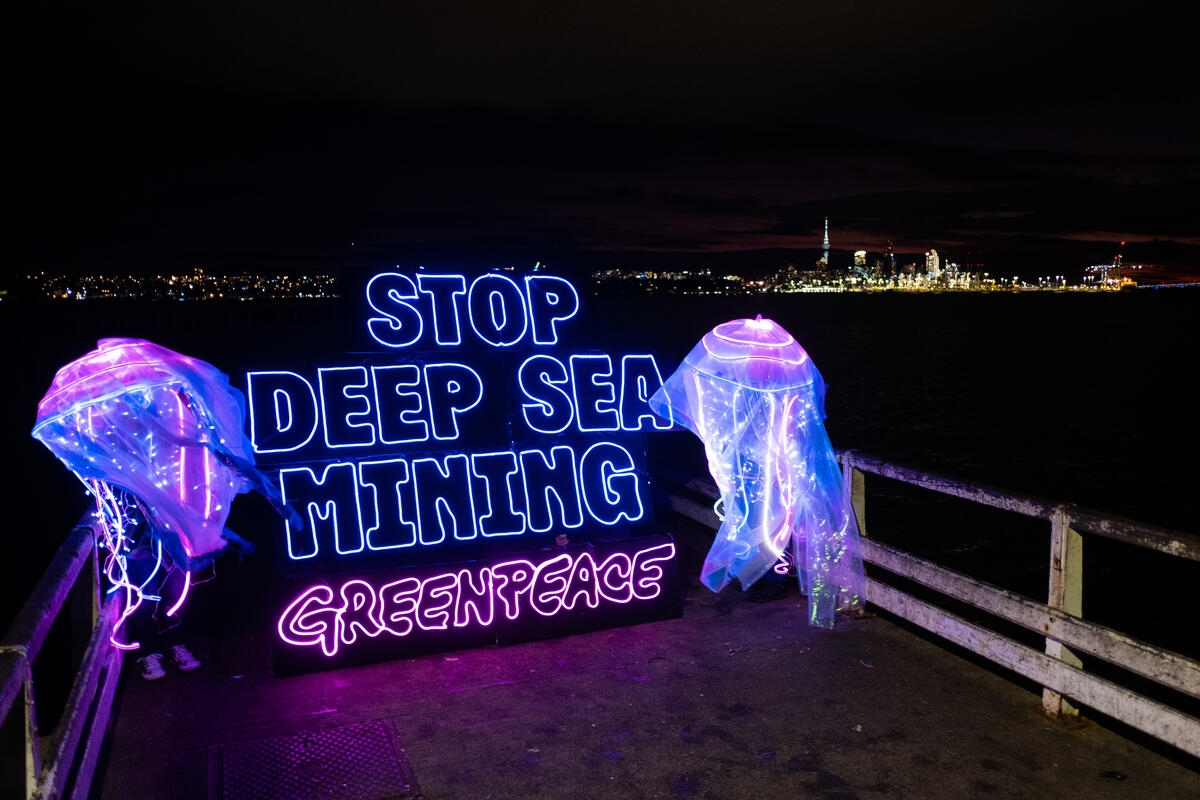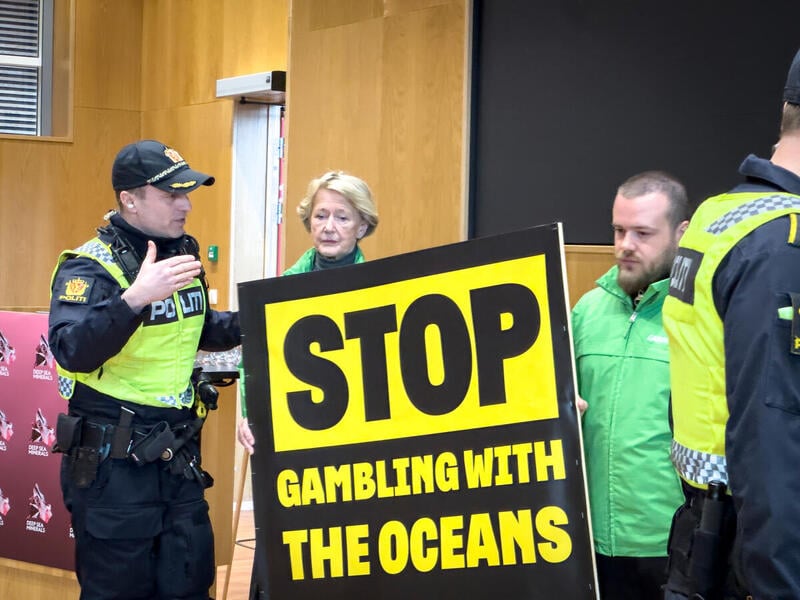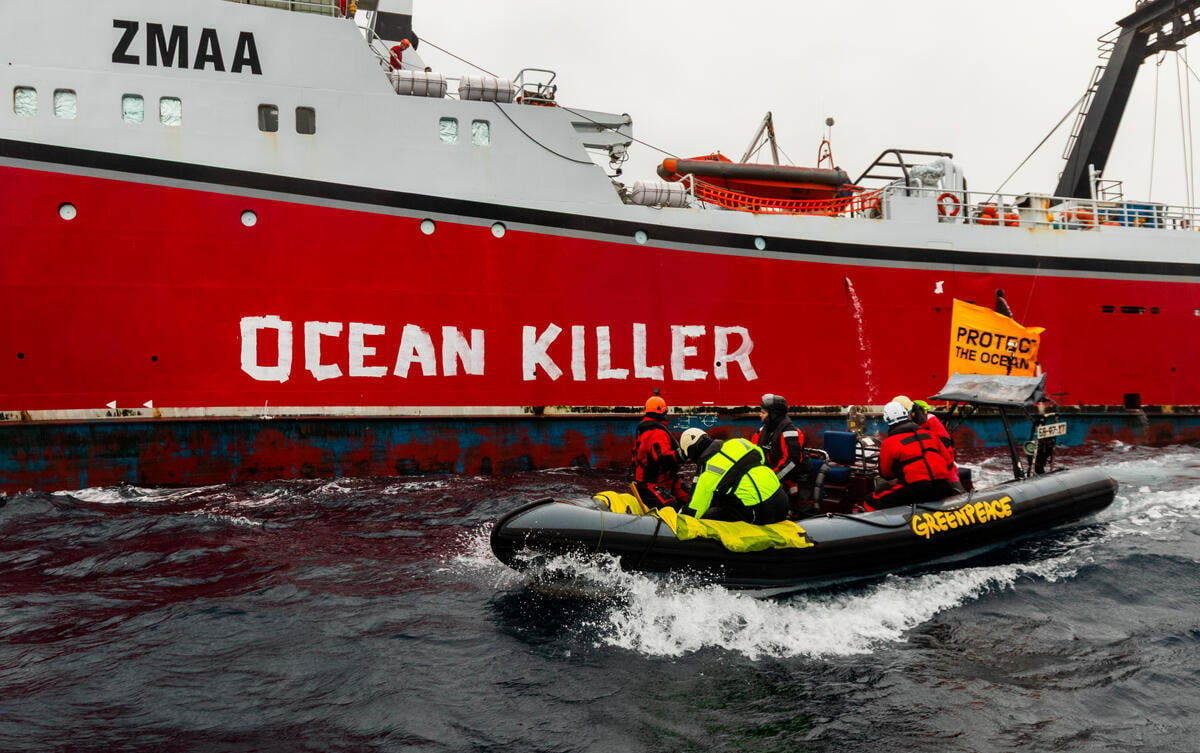Kingston, Jamaica – Marine scientists from around the world have issued a stark warning about the emerging industry of deep sea mining, stating that its development “puts the overall health of ocean ecosystems under threat” and could contribute to climate breakdown. [1] Greenpeace activists went to the International Seabed Authority (ISA) annual meeting in Kingston, joined by the members of Jamaica Environment Trust and representatives of several other Jamaican civil society organizations, to deliver a letter of concern by 28 scientists from eight countries to the participants of the meeting. A banner was unfurled at the event which said “No deep sea mining” as Greenpeace demands protection of the sea bed and global oceans. [2]
The Greenpeace ship, Esperanza, sailed to Jamaica from a major battleground for the deep sea mining industry, the “Lost City” in the mid-Atlantic, that is under threat after the ISA granted an exploration contract in the region. The Esperanza is in the middle of a pole to pole expedition from the Arctic to the Antarctic, highlighting threats to the ocean and calling for Global Ocean Treaty to protect international waters. [3] [4]
“The oceans are facing more threats now than at any time in history, but the dangerous deep sea mining industry wants to put yet more pressure on fragile ecosystems,” said Louisa Casson, of Greenpeace’s Protect the Oceans campaign. “The International Seabed Authority is responsible for regulating deep sea mining, but instead of safeguarding the deep ocean this so-called regulator is serving the interests of industry and ‘selling off’ the seabed for mining exploration. The ISA has never yet turned down a licence application, even covering amazing, unique places like the Lost City in the Atlantic Ocean that could harbour clues to the origins of life on Earth. Rather than allowing deep sea mining, governments need to focus their efforts on agreeing Global Oceans Treaty strong enough to pave the way for the creation of a network of ocean sanctuaries that will be off-limits to all forms of industrial exploitation, including deep sea mining.”
Suzanne Stanley, CEO of Jamaica Environment Trust, said: “We are joining the efforts of those holding world leaders accountable for their actions related to the health of our oceans. The rush towards deep sea mining puts the health of the world’s oceans at risk, threatening marine biodiversity and our common ecological heritage”.
The letter signed by marine scientists, delivered to governments at the ISA meeting, was led by Professor Gretchen Früh-Green, who was on the team that discovered the unique Lost City hydrothermal field less than 20 years ago. Scientists say that “the development of the deep-sea mining industry risks unavoidable damage to deep sea ecosystems” and “strongly encourage ISA to consider the input of the international science community when evaluating future requests for deep-sea mineral exploration”. Signatories include professors and researchers from the Woods Hole Oceanographic Institution and École Normale Supérieure in Paris.
“The environmental impacts of deep sea mining would not be restricted to the seabed,” said Professor Früh-Green. “We need a far greater public debate about whether we can collectively accept the harm to our oceans that deep sea mining would entail – including the potential loss of discoveries yet to be made. Today, there is very little standing between the natural wonders of the deep ocean and the mining industry.”
A recent Greenpeace report, In Deep Water, detailed the limitations of the ISA to protect deep sea environments from cumulative stresses such as fisheries, climate change and plastic pollution, highlighting the importance of ongoing negotiations for a Global Ocean Treaty that could put in place strong environmental safeguards across the global oceans. [5]
“Not only have corporations begun speaking on behalf of governments at ISA meetings, but this month’s summit is discussing highly restrictive proposals that could exclude civil society organisations warning against deep sea mining from future discussions,” said Casson. “The future of the deep ocean matters to us all, and 1.5 million people around the world are calling for governments to protect our oceans and the hidden treasures of the deep sea from reckless exploitation.”
ENDS
Photos will appear here
Photos of deep sea marine life can be downloaded here
Notes:
[1] See the full statement of concern from deep sea scientists here
[2] The peaceful assembly in Jamaica was organized by GPUK with GP activists from all over the world
[3] Pole to Pole Expedition: Map of the ‘Pole to Pole’ route. See contacts below for expedition enquiries, including for media interested in joining the ship on-board.
[4] Greenpeace and scientists are calling for a Treaty that can create a network of ocean sanctuaries covering at least a third of the global oceans by 2030. For more information see Protect the Global Oceans: Why We Need a Global Ocean Treaty. The second of four rounds of negotiation at the UN towards a treaty covering international waters took place in March and April this year. The third round of negotiations will take place at the United Nations in New York in August 2019, with the treaty process set to conclude with a fourth and final round in the first half of 2020.
[5] Download the In Deep Water: the emerging threat of deep sea mining report here
[6] For more details of potential impacts of seabed mining see here.
[7] Louisa Casson is an oceans campaigner at Greenpeace UK.
Contacts:
Julia Zanolli, Global Media Lead for the Protect the Oceans campaign, Greenpeace UK: [email protected], +44 07971 769107
Greenpeace International Press Desk: [email protected], +31 (0) 20 718 2470 (available 24 hours)
For the latest Greenpeace International press releases, please follow us on twitter @greenpeacepress



